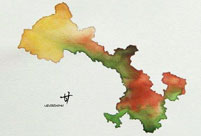 Motorcycle stunt on the Bund
Motorcycle stunt on the Bund
 French Spiderman Alain Robert climbs up Galaxy Hotel in Macao
French Spiderman Alain Robert climbs up Galaxy Hotel in Macao
 Africans in Guangzhou
Africans in Guangzhou
 Pole dancer shows strength and beauty up in the air
Pole dancer shows strength and beauty up in the air
 College girls call for protection of ecological space on earth
College girls call for protection of ecological space on earth
 Top 10 celebrities driving auto brands
Top 10 celebrities driving auto brands
 10 low-carbon tips to save money
10 low-carbon tips to save money
 Luxury cars make Asia premiere at Auto China
Luxury cars make Asia premiere at Auto China
 Versatile dog
Versatile dog
 Ni Ni covers BAZAAR JEWELRY
Ni Ni covers BAZAAR JEWELRY
DAEGU, South Korea, April 29 -- Environment ministers from China, South Korea and Japan on Tuesday discussed jointly response to common environmental challenges in Northeast Asia, stressing further strengthening of joint efforts to prevent and control air pollution.
The 16th Tripartite Environment Ministers Meeting among China, South Korea and Japan (TEMM16) has been held in Daegu, a city southeast of South Korea from April 28 to 29.
The meeting was attended by Chinese vice environment minister Li Ganjie, South Korean environment minister Yoon Seong-kyu and Japanese environment minister Ishihara Nobuteru.
The three ministers adopted and signed on the Joint Communique at the meeting, reaffirming their willingness to enhance the tripartite collaboration regarding a wide range of environmental challenges including water pollution, marine litter, dust and sandstorms, chemicals risks, climate change, and biodiversity loss.
They also reiterated commitment to cooperation for the success of the 12th Conference of the Parties to the Convention on Biological Diversity (CBD COP12) to be held in Pyeongchang in October this year.
At the meeting, Li acknowledged that China faces tough environmental problems, adding that Chinese government has clearly realized that reducing air pollution is tough tasks that require long-term hard work. China is willing to boost cooperation with South Korea and Japan to fight against these environment challenges.
Li emphasized that China's new environmental protection laws, which has been revised for the first time in the past 25 years, was a major breakthrough on clarifying the responsibility of government of all levels, strengthening environmental supervision and management, enlarging access to information and encouraging public participation.
But he warned that the strict and continuing implementation was needed to make the law really work.
South Korea's environment minister Yoon Seong-kyu emphasized the urgent need to reduce air pollution in the Northeast Asian region while proposing "air quality improvement" as a priority area for future environmental cooperation among the three countries.
Yoon introduced its national policies to address trans-boundary air pollution including particulate matter, the PM 2.5 or fine dust, and suggested taking coordinated actions against PM among the three countries.
Meanwhile, the ministers of China and South Korea discussed the revision of their environmental cooperation MOU for the purpose to facilitate cooperative activities to combat fine dust together.
Japan introduced its latest policies and measures for environmental issues such as monitoring and reducing PM 2.5, the adoption of floating wind power generation equipment and other new- energy installations.
In addition, Meng Fan, acting director of Atmospheric Environment Institute of Chinese Research Academy of Environmental Sciences, together with the other two winners from South Korea and Japan, have been presented the 2nd TEMM Environment Awards for their outstanding contribution to China-South Korea-Japan environmental cooperation during the conference.
The annual meeting has been held in rotation among China, South Korea and Japan as the highest level environmental cooperation platform in Northeast Asia since its launch in 1999.
 Overseas returnees strive for dreams in Beijing
Overseas returnees strive for dreams in Beijing Fried up: Chili pork bonanza in Central China
Fried up: Chili pork bonanza in Central China Hand-painted maps go viral online
Hand-painted maps go viral online 4th Beijing Int'l Film Festival ends
4th Beijing Int'l Film Festival ends Commando elite specializes in sign language
Commando elite specializes in sign language Man photoshops himself into girlfriend's childhood photos
Man photoshops himself into girlfriend's childhood photos Photo story: Stallholders at Beijing Zoo Wholesale Market
Photo story: Stallholders at Beijing Zoo Wholesale Market Artists on backstage
Artists on backstage Beckham launches fund to support youth soccer in China
Beckham launches fund to support youth soccer in China 'African Street' in Guangzhou
'African Street' in Guangzhou Special operation members in comprehensive training
Special operation members in comprehensive training Cute Shaolin boy melts the hearts of millions
Cute Shaolin boy melts the hearts of millions Giant panda Sijia is back to happy life
Giant panda Sijia is back to happy life Richest Chinese of 2014: half from the mainland
Richest Chinese of 2014: half from the mainland Chengdu - laid-back lifestyle makes happiest city
Chengdu - laid-back lifestyle makes happiest cityDay|Week|Month